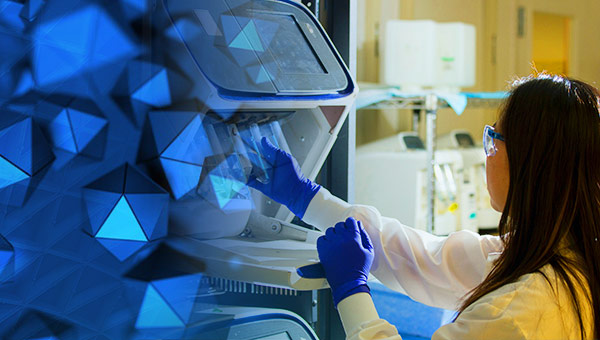Guofeng “George” Gao, M.D., Resident Pathologist
Nam Tran, Ph.D., M.S., F.A.C.B., Director of Clinical Chemistry and POCT
Background
Biotin, also known as Vitamin B7, is a co-factor in fatty acid metabolism, amino acid degradation, and gluconeogenesis. The recommended daily intake (RDI) for biotin is extremely low—about 30 µg/day.1 Given the low RDI, biotin deficiency is rare. In recent years, there has been a surge in biotin supplementation for various reasons including as a beauty product. Biotin is now found in multivitamin preparations, as well as cosmetic products. Interestingly, there is discussion that high dose biotin (100-300 mg/day) may have a role in treating certain diseases such as Multiple Sclerosis (MS).2
The increased use of biotin by patients creates a potential problem with modern laboratory immunoassays.1 Biotin is used to conjugate antibodies for routine immunoassay tests including thyroid stimulating hormone (TSH), cardiac troponins, carcinoembryonic antigen (CEA), among many others. In vitro diagnostic (IVD) manufacturers leverage biotin's affinity to streptavidin to conjugate large molecules such as antibodies for their assays. There have been reports of biotin interference causing misdiagnosis of thyroid disorders.3 These case studies generate great concern not only for endocrinology patients, but also those with suspected myocardial infarction being tested with a biotinylated cardiac troponin immunoassay.
Lab Best Practice
Biotinylated immunoassays are common, with biotin being one of many interfering substances that can impact laboratory testing. First and foremost, IVD manufacturers have evaluated the performance of their assays against biotin at concentrations at or near 56 ng/mL.4 At 56 ng/mL, we would not expect any biotin interference if patients meet and do not exceed the RDI of 30 µg/day. Furthermore, the rapid clearance of biotin (half-life =2 hours) works to our favor whereby even at 5 and 10 mg/day concentrations, the levels should not reach levels to interfere with modern biotinylated immunoassays. Concerns may arise in the emergency care setting for ruling out myocardial infarction. However, again, the rapid clearance of biotin works in the assay's favor. Studies have shown that most patients presenting to the emergency department had experienced chest pain hours before admission5—providing time for any biotin to clear the body. Additionally, serial cardiac troponin testing current requires at least two measurements to be made over a few hours. Therefore it is unlikely that biotin would impact cardiac troponin testing. At UCDMC, we conducted a pilot interference study evaluating the impact of biotin therapy on TSH testing. We compared the performance of a biotinylated assay (cobas, Roche Diagnostics) against an assay that does not use biotin conjugation (i1000, Abbott Laboratories). There was no statistical or clinical difference between the assays among patients taking between 2.5 to 10 mg/day of biotin (Figure 1). To this end, the lab best practice for managing patients with biotin therapy is to: (a) educate patients that they should not take biotin before having blood drawn for laboratory testing, and (b) clinicians should be aware of biotin interference, but the concentration of biotin (not just the presence of the molecule) makes the interference.

Figure 1. The figure illustrates no statistical or clinical significance in performance between the cobas and i1000 platforms among patients taking 2.5 to 10 mg/day of biotin. Mean (SD) bias was 0.13 µIU/mL (P=0.094).
References
- Chun KY. Biotin interference in diagnostics. http://clinchem.aaccjnls.org/content/63/2/619, Accessed on June 1, 2017
- Sedal F, Papeix C, Bellanger A, et al. High doses of biotin in chronic progressive multiple schlerosis: a pilot study. Mult Scler Relat Disord 2015;159.
- Kummer S. Biotin treatment mimicking Grave's disease. N Engl J Med 2016;375:704
- Roche Diagnostics Product TSH Assay Product Insert, Accessed on June 1, 2017
- DeVon HA, Hogan N, Ochs AL, et al. Time to treatment for acute coronary syndromes: the cost of indecision. J Cardiovasc Nurs 2011;25:106.



